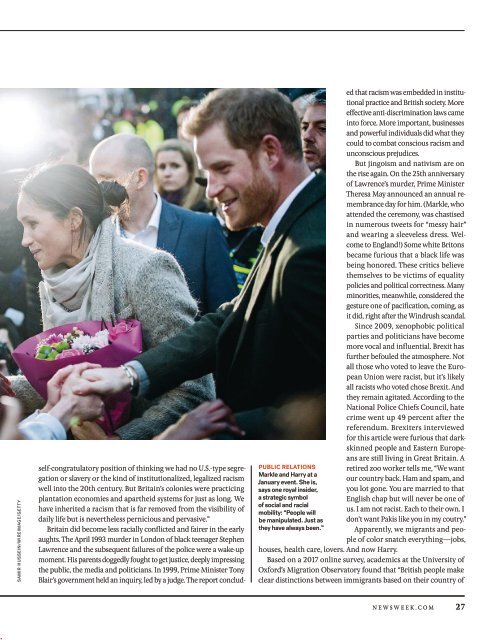Create successful ePaper yourself
Turn your PDF publications into a flip-book with our unique Google optimized e-Paper software.
SAMIR HUSSEIN/WIREIMAGE/GETTY<br />
PUBLIC RELATIONS<br />
Markle and Harry at a<br />
January event. She is,<br />
says one royal insider,<br />
a strategic symbol<br />
of social and racial<br />
mobility: “People will<br />
be manipulated. Just as<br />
they have always been.”<br />
self-congratulatory position of thinking we had no U.S.-type segregation<br />
or slavery or the kind of institutionalized, legalized racism<br />
well into the 20th century. But Britain’s colonies were practicing<br />
plantation economies and apartheid systems for just as long. We<br />
have inherited a racism that is far removed from the visibility of<br />
daily life but is nevertheless pernicious and pervasive.”<br />
Britain did become less racially conflicted and fairer in the early<br />
aughts. The April 1993 murder in London of black teenager Stephen<br />
Lawrence and the subsequent failures of the police were a wake-up<br />
moment. His parents doggedly fought to get justice, deeply impressing<br />
the public, the media and politicians. In 1999, Prime Minister Tony<br />
Blair’s government held an inquiry, led by a judge. The report concluded<br />
that racism was embedded in institutional<br />
practice and British society. More<br />
effective anti-discrimination laws came<br />
into force. More important, businesses<br />
and powerful individuals did what they<br />
could to combat conscious racism and<br />
unconscious prejudices.<br />
But jingoism and nativism are on<br />
the rise again. On the 25th anniversary<br />
of Lawrence’s murder, Prime Minister<br />
Theresa May announced an annual remembrance<br />
day for him. (Markle, who<br />
attended the ceremony, was chastised<br />
in numerous tweets for “messy hair”<br />
and wearing a sleeveless dress. Welcome<br />
to England!) Some white Britons<br />
became furious that a black life was<br />
being honored. These critics believe<br />
themselves to be victims of equality<br />
policies and political correctness. Many<br />
minorities, meanwhile, considered the<br />
gesture one of pacification, coming, as<br />
it did, right after the Windrush scandal.<br />
Since 2009, xenophobic political<br />
parties and politicians have become<br />
more vocal and influential. Brexit has<br />
further befouled the atmosphere. Not<br />
all those who voted to leave the European<br />
Union were racist, but it’s likely<br />
all racists who voted chose Brexit. And<br />
they remain agitated. According to the<br />
National Police Chiefs Council, hate<br />
crime went up 49 percent after the<br />
referendum. Brexiters interviewed<br />
for this article were furious that darkskinned<br />
people and Eastern Europeans<br />
are still living in Great Britain. A<br />
retired zoo worker tells me, “We want<br />
our country back. Ham and spam, and<br />
you lot gone. You are married to that<br />
English chap but will never be one of<br />
us. I am not racist. Each to their own. I<br />
don’t want Pakis like you in my coutry.”<br />
Apparently, we migrants and people<br />
of color snatch everything—jobs,<br />
houses, health care, lovers. And now Harry.<br />
Based on a 2017 online survey, academics at the University of<br />
Oxford’s Migration Observatory found that “British people make<br />
clear distinctions between immigrants based on their country of<br />
NEWSWEEK.COM<br />
27


